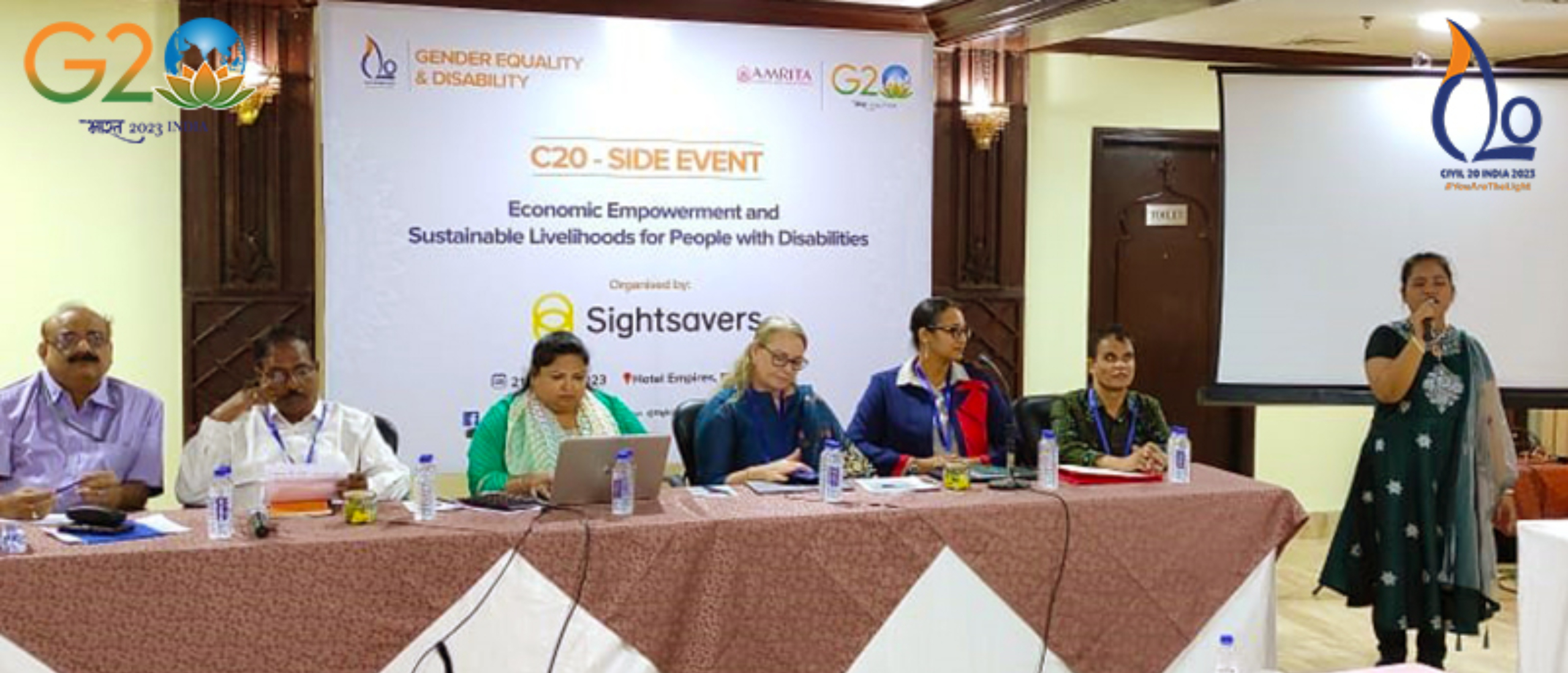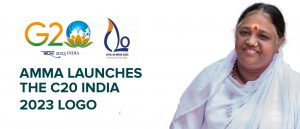This Side Event of the Civil 20 Working Group on Gender Equality & Disability (GED) was organized by Sightsavers India, in Bhubaneswar, Odisha on April 21, 2023, on Economic Empowerment and Sustainable Livelihoods for People with Disabilities.
The goal of the event was to identify recommended policy additions seen as beneficial to be presented to G20 countries.
The following policy recommendations were discussed:
- Health and life Insurance for all PWDs above 40: It is recommended that health and life insurance be provided to all persons with disabilities (PWDs) who are above 40. This would ensure that PWDs have access to quality healthcare services and financial security in case of any medical emergencies.
- Aids and appliances supplied to PWD but maintenance is not covered by the state: While aids and appliances are provided to PWDs, maintenance and repairs of these items are not covered by the state. It is crucial that the government extends financial support for the upkeep of these aids and appliances to ensure that PWDs have uninterrupted access to them.
- Reservation in housing scheme must be extended from 5% to 10% for PWDs: The current reservation in housing schemes for PWDs stands at 5%. However, it is recommended that this reservation be extended to 10% to ensure adequate housing opportunities for PWDs.
- Health protection to be linked with social protection: Linking health protection with social protection can ensure that PWDs have access to essential healthcare services, including preventive care and rehabilitation, without incurring financial hardship. This can be achieved through policies and programs that provide social security, income support, and health insurance to PWDs.
- Early identification is crucial to handle Disability: Early identification of disabilities is crucial for effective management of disabilities. This can be achieved through the implementation of screening programs, regular health check-ups, and awareness campaigns on the importance of early detection and intervention.
- One-stop centre and short stay homes to be accessible for women with disabilities: Accessibility to one-stop centres and short stay homes is essential for women with disabilities to access support services and shelter when needed. It is recommended that these facilities be made accessible and equipped with appropriate assistive devices and accommodations to meet the needs of women with disabilities.
- Under the public distribution system, priority households must be identified and supported immediately. PWDs should be prioritized in it: To ensure that PWDs have access to PDS, they should be prioritized under the public distribution system. It is recommended that priority households be identified and supported immediately to ensure that PWDs receive the necessary support.
- All schools and teachers must sign a disability policy ensuring no hard like a child protection policy – it must be mandatory for all: All schools and teachers should sign a disability policy, similar to a child protection policy, to ensure that students with disabilities have access to quality education and support services without exploitation, abuse and harm. This should be made mandatory for all schools to ensure effective implementation.
- The government must promote research in disability: Research in disability is crucial to inform policy and program development, as well as to identify and address gaps in the system for PWDs. The government should invest in research and innovation in this area to improve outcomes for PWDs.
- Universities all over India shall be accessible: Accessibility to universities is essential to ensure that students with disabilities have access to quality education. It is recommended that universities all over India be made accessible, with appropriate infrastructure and accommodations, to meet the needs of students with disabilities.
- Odisha state relief code to be revised with disabilities and gender inclusion: No que system to be adopted while distributing relief materials to child, women and persons with disabilities and relief materials are distributed in an inclusive manner, with due consideration to disabilities and gender.
- Zero % interest loan to women with disabilities: This recommendation suggests that women with disabilities should be provided with interest-free loans. This can help to address financial barriers that often limit their ability to start businesses or pursue education and training opportunities. By offering interest-free loans, women with disabilities can access the capital they need to launch their own businesses or invest in their own education without having to worry about high interest rates or other financial burdens.
- Amendment of DV act to include Women with Disabilities: This recommendation calls for the amendment of the Domestic Violence (DV) Act to explicitly include provisions for protecting women with disabilities from violence and abuse. This is important because women with disabilities are often at a higher risk of experiencing domestic violence and may face additional barriers in seeking help or accessing support services.
- Equal opportunity cells must be in all institutions: This recommendation suggests that all institutions, including educational institutions and workplaces, should establish equal opportunity cells to ensure that individuals with disabilities have equal access to education, employment, and other opportunities. This can help to promote a more inclusive and accessible society and ensure that individuals with disabilities are not unfairly disadvantaged or excluded from opportunities based on their disability.
- Database of PWD entrepreneurs must be created and provided with support required by them so that they can develop their business: This calls for the creation of a database of entrepreneurs with disabilities, and the provision of appropriate support to enable them to develop their businesses. By providing targeted support and resources, individuals with disabilities can overcome the unique challenges they face in starting and growing their own businesses and contribute to the overall economic development of their communities.
- SME of PWDs to be promoted -so that they can deliver mass production with high quality so that big companies or trading communities will attract customers to buy their product: This recommendation suggests that small and medium-sized enterprises (SMEs) owned by individuals with disabilities should be promoted, enabling them to produce high-quality goods on a large scale. This can help to attract customers from larger companies or trading communities and promote the growth and success of SMEs owned by individuals with disabilities. Additionally, by promoting the development of SMEs, individuals with disabilities can create new job opportunities and contribute to the overall economic growth of their communities.
- * Land and loans to be available to all PWDs with subsidies for entrepreneurship and development of business: This recommendation calls for the availability of land and loans with subsidies for entrepreneurship and business development to all individuals with disabilities. This can help to address financial and other barriers that often limit the ability of individuals with disabilities to start and grow their own businesses. By providing targeted support and resources, individuals with disabilities can overcome the unique challenges they face in entrepreneurship and contribute to the overall economic development of their communities.
Selected policy recommendation:
- State disability Data policy: The National/State disability Data policy aims to address the lack of coordination and convergence of disability data among various government departments. It recommends the aggregation of segregated data to a common data portal, and mandates that all data collected through the census follows the policy guidelines. The policy also enables individuals to access data through a DIGI locker with required credentials and provides capacity building for officials on the use of data for better monitoring and decision-making. By implementing this policy, the government can improve its capacity to design, implement, and evaluate policies and programs that address the needs of persons with disabilities.
To improve the collection, management, and utilization of disability data, the government should develop a comprehensive disability data policy, overseen by the nodal department of the Rights of Persons with Disability Act, 2016. Census counting of persons with disability should follow this policy to ensure accurate statistics. Data should be collected in key areas such as health, education, livelihood, women, social security services, employment, and skill development, and a common database of disability data maintained by the State Social Empowerment and Persons with Disabilities department. The data collected by different departments should be converged and aggregated within different sectors, with accessible methods of collection for all persons with disabilities. Capacity building and regular monitoring should be undertaken to ensure the accuracy and utilization of disability data for policy and program planning, monitoring, and evaluation. Lastly, data protection measures must be implemented to ensure the privacy and dignity of individuals with disabilities.




